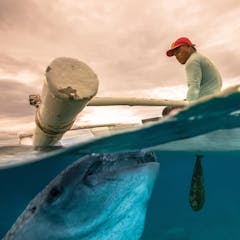
Articles on Sharks
Displaying 81 - 100 of 214 articles

Scientists thought there was only one sixgill sawshark species – until now.

Shark skin is composed of millions of tiny scales, which have a similar chemical composition to human teeth.

Weeks out from summer, new research says there is no evidence shark nets keep us safe from sharks.

Shark fisheries in Indonesia are an important economic resource in several areas. Hence, stronger regulations are needed to prevent declines in shark population.

Queensland can no longer cull sharks in protected areas of the Great Barrier Reef, but it’s time to move away from culls, nets and drumlines altogether. There are better ways to keep our beaches safe.

The eastern Arctic and sub-Arctic marine areas of Canada are changing rapidly under climate change.

Former fishermen in the Philippines are lifting their families out of poverty through whale shark tourism.

Media coverage of sharks often exaggerates risks to people, but more than 500 shark species have never been known to attack humans, and there’s lots to learn about them.

Even the remote open ocean offers no escape from industrial fishing for sharks.

Far more megafauna species use coastal wetlands than we thought. And it affects the way we need to address the extinction crisis.

Why do scientists spend so much time and money mapping the DNA of species like white sharks? Single studies may offer insights, but the real payoff comes in comparing many species to each other.

The False Bay ocean food chain in Cape Town began to change significantly in 2015 with the appearance of shark-eating killer whales.

Banning fishing in no-take marine reserves on the Great Barrier Reef does not protect sharks as well as received wisdom would tell you.

Some media have reported shark numbers at ‘plague proportions’ in Australian waters. But a new analysis suggests the opposite: species such as hammerheads and white sharks have plummeted in number.

Drones are now being used to warn beachgoers about sharks – with groundbreaking accuracy.

The return of white sharks to Cape Cod, Massachusetts was a tourism success story – until a shark killed a swimmer. Can the Cape’s residents and visitors learn to share the ocean with these apex predators?

Africa’s remaining sawfishes are found along the coasts of Madagascar and Mozambique. But they are under threat.

Sharks have a PR problem. But new research shows that shark ecotourism programs boost people’s knowledge and attitudes towards shark conservation – even among those who are green-minded to begin with.

Forget the scare stories, sharks are good for our oceans.

The Meg has all the typical monster movie cliches including some terrifically bad dialogue. But what about the science?
